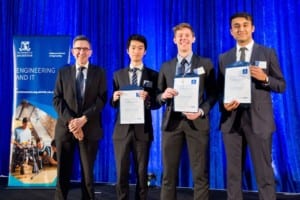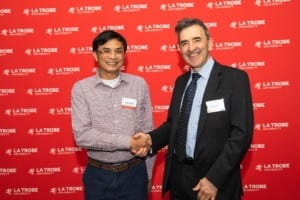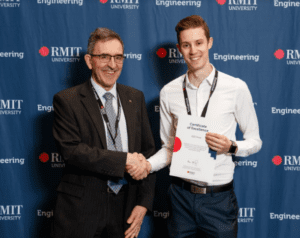IEEE Victorian Student Awards 2019
University of Melbourne Student Prize (2019)
The IEEE Victorian Section sponsored a prize at The University of Melbourne’s Annual Endeavour Exhibition at which students present their capstone projects.
The IEEE Award for Technical Innovation and Engineering Achievement for 2019 went to “The Flying Scarecrow” developed for SmartBird Solutions by Alistair Chandler, Nathan D’Souza and Jeffrey Zhu.
Indoor drone flight and path planning is important for many industrial applications, but is challenging due to insufficient GPS accuracy. This project presents a low-cost system for autonomous tethered indoor flight. Using ultra-wideband technology for accurate path planning, with provisions for the drone to be quickly deployed at multiple sites. A contact-based charging station allows for the drone to charge automatically when it lands. The system is designed to be largely user-independent, with an option for manual control. The initial application will be the deterrence of birds in warehouses and factories, with the technology having potential to be utilised in a wider context.
IEEE La Trobe University Student Prize (2019)
The IEEE Award for Technical Innovation and Engineering Achievement was awarded to Fernando J. Galetto for his capstone project ‘Embedded Machine Intelligence System for PPE Detection’ at La Trobe University’s Engineering & IT Showcase 2019.
Fernando developed a working embedded system that can detect whether a person is wearing protective equipment (PPE) in real-time. The development involves collecting a large number of images as the dataset, training a deep neural network, and deploying it in a low-cost embedded system which consists of a Raspberry Pi as the host computer and an Intel Neural Processing unit as the main processor. Fernando used software tools such as Tensorflow from Google and OpenVino from Intel. He also implemented the system in an Intel FPGA which is capable of processing HD videos from 4 cameras in real-time at 60 frames/second. IEEE’s Robert Slaviero is seen presenting the award to Fernando’s supervisor Dr Dennis Deng, as Fernando was overseas at the time.
IEEE RMIT University Student Prize (2019)
Luke Fowler was awarded the IEEE Award for Technical Innovation and Engineering Achievement at RMIT University’s Engenius Exhibition 2019 for his work on Wireless Sensor Networks, and his project ‘Sensor data compression for low data rate, low power networks’.
His project presents a robust compression algorithm targeted specifically at low-power, low data rate sensor devices. It utilizes binary pattern recognition techniques to exploit temporal and spatial data redundancies in application-level payloads to reduce the overall transmission size by up to 94%, regardless of the application-level formatting.
It does so without sacrificing data granularity (i.e. losslessly) and includes error checking functionality to help mitigate transmission errors. Its scalable and modular design allows it to be easily adapted to many types of wireless sensor node, regardless of application. As proof of its feasibility, the algorithm was deployed on a pair of MultiTech xDot LoRa devices. It is shown to reliably achieve beneficial compression, even when faced with sub-optimal transmission reliability. It thus benefits both new and existing WSNs, making low data rate technologies accessible to more demanding applications due to the overall increase in throughput.



